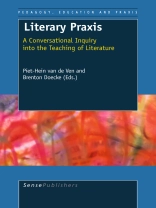Literary Praxis: A Conversational Inquiry into the Teaching of Literature explores the teaching of literature in secondary schools. It does this from the vantage point of educators in a range of settings around the world, as they engage in dialogue with one another in order to capture the nature of their professional commitment, the knowledge they bring to their work as literature teachers, and the challenges of their professional practice as they interact with their students. The core of the book comprises accounts of their day-to-day teaching by Dutch and Australian educators. These teachers do more than capture the immediacy of the here-and-now of their classrooms; they attempt to understand those classrooms relationally, exploring the ways in which their professional practice is mediated by government policies, national literary traditions and existing traditions of curriculum and pedagogy. They thereby enact a form of literary ‘praxis’ that grapples with major ideological issues, most notably the impact of standards-based reforms on their work. Educators from other countries then comment on the cases written by the Dutch and Australian teachers, thus taking the concept of ‘praxis’ to a new level, as part of a comparative inquiry that acknowledges the richly specific character of the cases and resists viewing teaching around the world as though it lends itself unproblematically to the same standards of measurement (as in the fetish made of PISA). They step back from a judgmental stance, and try to understand what it means to teach literature in other educational settings than their own. The essays in this collection show the complexities of literature teaching as a form of professional praxis, exploring the intensely reflexive learning in which teachers engage, as they induct their students into reading literary texts, and reflect on the socio-cultural contexts of their work.
Tabla de materias
PART 1: COMPARATIVELY SPEAKING; 1. Opening their Teaching up to Scrutiny; 2. A Conversational Inquiry; PART 2: TEACHING AND REFLECTING; 3. Literary Conversations: An Australian Classroom; 4. ‘I’ll Never Know What it is Like to be Pregnant’: Teaching Literature in a Dutch Secondary School; 5. Toward an Understanding of Literature Teaching in Australia: Hanging On and Letting Go; 6. Between Dream and Deed: Constructive and Destructive Frictions in an Ill-Structured Domain; PART 3: READING AND REREADING; 7. If in Doubt, Reach for a Story; 8. Reflection on Literature Teaching: A Norwegian Perspective; 9. Texts, Tasks, and Talk; 10. Difference in the Classroom: Whose Reading Counts?; 11. ‘Authenticity was Never Really the Question’: Reading, Ethics and the Historical Interruption of Literature Teaching by English; 12. Literature Classrooms and their Limits; 13. Reading the Word and the World: Teachers and Students Renegotiate Literature Reading, Teaching and Learning; PART 4: CONTINUING THE CONVERSATION; 14. Literary Praxis: (A Concluding Essay); List of Contributors; Index.












